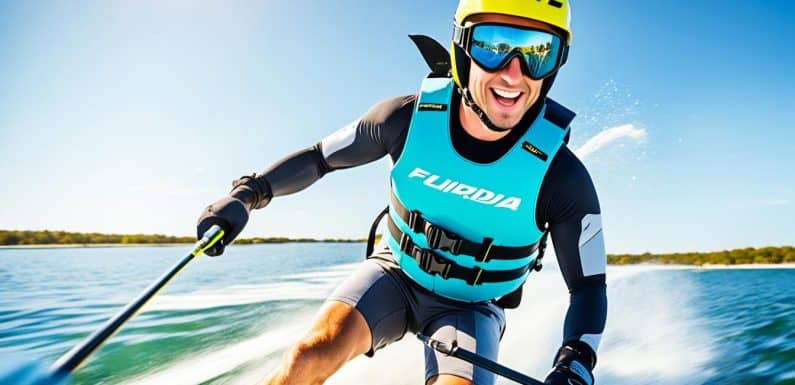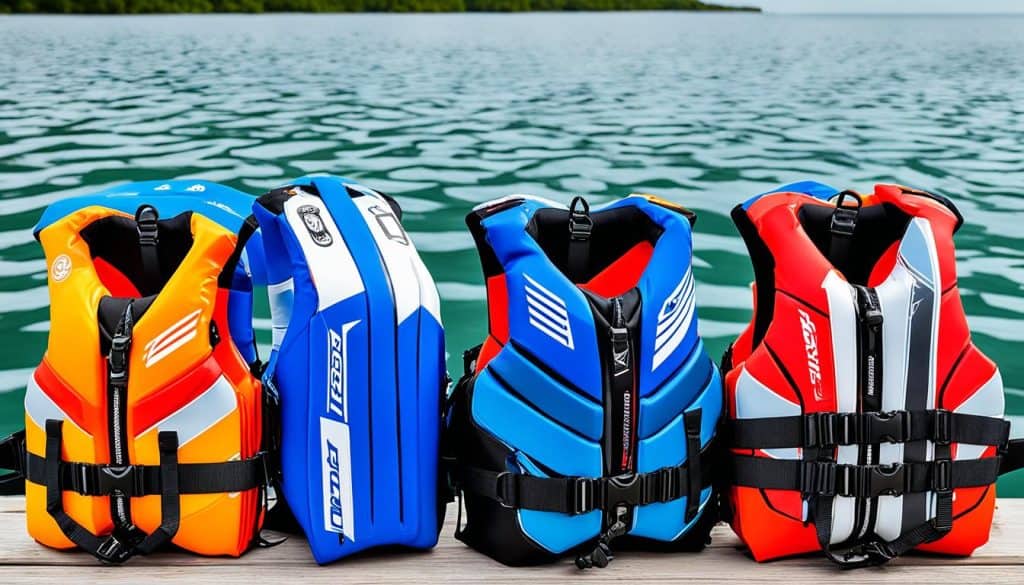
In Florida, those eager to glide across the waves on skis need to adhere to certain safety standards—under Florida law, it is legally required that any person water skiing must wear a U.S. Coast Guard-approved personal flotation device (PFD). This attire mandate forms a crucial part of the state’s safety regulations to ensure the well-being of water sports enthusiasts. Complying with these rules helps prevent harmful incidents and avoids legal repercussions for participants.
Understanding the intricacies of Florida law regarding water skiing attire is essential for both first-time skiers and seasoned pros. Not only does it guarantee personal safety, but it also conserves the spirit of responsible recreation. Whether you’re skimming the surface of Florida’s picturesque waterways or refining your slalom technique, knowing and embracing these legal requirements is key to a hassle-free aquatic adventure.
Key Takeaways
- Florida’s water safety regulations mandate the use of U.S. Coast Guard-approved PFDs for water skiers.
- Legally required gear for water skiing encompasses more than just any life jacket; it specifies non-inflatable wearable PFDs.
- These regulations are fundamental in ensuring the safety and buoyancy of participants during water skiing activities.
- Familiarity and adherence to these attire laws are instrumental in avoiding penalties and ensuring an enjoyable water skiing experience.
- Lawful attire, especially during low light conditions and under strict operator supervision, embodies responsible and secure water skiing practices.
Understanding Florida’s Water Skiing Safety Regulations
With miles of picturesque coastlines and waterways, Florida is a haven for water sports enthusiasts. Protecting participants is paramount, leading to the implementation of stringent water skiing safety regulations. These guidelines are not only for the safety of skiers and aquaplaners but to also provide a structure within which the exhilarating sport of water skiing can be safely enjoyed. Furthermore, Florida’s close attention to these rules also supports the efforts by the U.S. Coast Guard to maintain high safety standards on the water.
U.S. Coast Guard-Approved PFDs
At the core of these regulatory measures is the mandatory use of U.S. Coast Guard-approved personal flotation devices (PFDs) for anyone participating in water skiing activities. The law stipulates that these PFDs must be worn at all times to enhance buoyancy and safety, diminishing the risk of drowning in the unfortunate event of an accident.
Regulations for Skiers and Aquaplaners
The state of Florida has specific regulations for skiers and aquaplaners, essential for minimizing accidents and injuries. These rules insist on continuous, direct supervision, either by an observer present in the towing boat or through the use of an approved wide-angle rear-view mirror. This ensures that swift action can be taken if a skier falls into the water or signals for help.
Restrictions During Low Light Conditions
To address the dangers presented by low light conditions, there are prohibitions on water skiing from dusk till dawn. This period is determined as one-half hour after sunset to one-half hour before sunrise. Water skiing during these times is hazardous due to reduced visibility, which significantly increases the risk of collisions and other accidents.
Operator Supervision Requirements
The role of the vessel operator is critical in maintaining a safe environment for water skiing. As part of the operator supervision requirements, the individual in charge of the boat must always be alert and in full control of the vessel. They must refrain from behaviors that could be distracting, such as using a mobile phone or consuming alcohol while operating the boat.
Adherence to these safety regulations is not just about legal compliance; it’s about fostering a culture of safety and responsibility that ensures the well-being of those who take to Florida’s waters for recreation and sport.
| Safety Requirement | Regulation Details | Enforced By |
|---|---|---|
| Personal Flotation Devices | Must be U.S. Coast Guard-approved and worn at all times. | Florida State Law |
| Supervision | Presence of an observer or a wide-angle rear-view mirror required. | Florida Fish and Wildlife Conservation Commission |
| Water Skiing Hours | Prohibited from one-half hour after sunset to one-half hour before sunrise. | Florida State Law Enforcement |
| Operator Conduct | Operator must remain alert and in control; no distractions permitted. | U.S. Coast Guard |
What Is Legally Required to Be Worn by a Person When Water Skiing
Florida’s gleaming coastlines and water bodies make it a haven for water skiing enthusiasts, yet they must strictly adhere to specific regulations to ensure safety. Adherence to legally required attire is not just about compliance, but also about ensuring water enthusiasts come back to the shores safely, every time. Below we delve into the necessary attire and accompanying regulations essential for anyone looking to make waves in the sport of water skiing.
U.S. Coast Guard-Approved PFDs
First and foremost, staying afloat in the event of an unplanned dismount is critical, which is why the use of U.S. Coast Guard-approved personal flotation devices, or PFDs, is non-negotiable. These PFDs must be non-inflatable and worn at all times by skiers to provide not only buoyancy but also visibility, thereby significantly reducing the risk of drowning and collision.
Regulations for Skiers and Aquaplaners
The attire of both skiers and aquaplaners is subject to specific regulations that extend beyond PFDs. This includes the mandate that the attire should not impair the individual’s ability to swim or float, adding an extra layer of safety. Skiers are advised to wear brightly colored and fitted clothing to maximize visibility and minimize risks.
Restrictions During Low Light Conditions
Low light conditions pose additional hazards for water skiing by reducing visibility, which is why operating under such conditions comes with its own set of attire recommendations. Skiers are expected to wear reflective materials or additional safety lights to ensure they are distinguishable in the waning light, aligning with the Coast Guard’s insistence on visibility.
Operator Supervision Requirements
Firm on the list of operator supervision requirements stands the necessity for those behind the helm to ensure all skiers are appropriately attired according to federal and state law. This regulation stresses the critical role of the operator in maintaining the safety of the participants through diligent supervision, ensuring that legally required gear is used at all times.
For an exhaustive understanding of what Florida mandates as legally required attire for water skiing, it’s advisable to consult the latest guidelines issued by the U.S. Coast Guard and to stay abreast of any changes in state regulations. Ensuring everyone’s safety is largely a collective effort between the water skiing enthusiasts and the vessel operators, harmonizing fun with responsibility.

Penalties for Non-Compliance with Water Skiing Attire Laws
In Florida, water skiing is not just a pastime but an activity regulated by law, especially when it comes to safety attire. The state’s commitment to ensuring the well-being of water sports enthusiasts is echoed in the firm enforcement of these laws. Should an individual decide to ignore the water skiing attire laws, they face the possibility of various penalties for non-compliance. These penalties are a reflection of Florida’s dedication to maintain safety standards and reduce the likelihood of water-related accidents.
The specific penalties tied to disregarding Florida’s water skiing attire laws can differ based on the infraction’s seriousness. For minor violations, an offender may receive a citation which could incur a fine. More serious violations could potentially lead to increased fines, mandatory safety courses, or even restriction from participating in water skiing activities for a set period. These legal repercussions serve as a deterrent and remind skiers of the importance of wearing the correct safety gear, including U.S. Coast Guard-approved personal flotation devices (PFDs).
While enjoying the thrill of water skiing in the Sunshine State, it is crucial to uphold the law to not only evade the unpleasantness of penalties, but also to ensure an enjoyable and secure experience for all involved. Compliance with the law is not just about avoiding fines or citations; it’s about contributing to a safety culture that values every individual’s welfare on the water. Therefore, understanding and adhering to Florida’s water skiing attire laws should be at the forefront of any water skier’s mind before they take to the waves.
